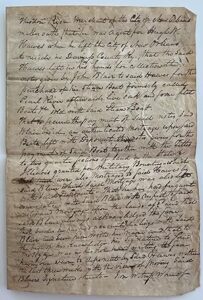Hugh Walker Hawes, who came from Kentucky in 1839 and settled on Matagorda Island, established a ranching tradition that was carried on through many generations until 1940 when the land was taken from the family by the government at the start of WWII.

A historical note..
Offer for sale of newspaper clipping…Condition: Very Good. 1837 ALS Concerning Sale of the Steamboat Pearl River, Hugh W. Hawes, New Orleans, Louisiana, 1837, 7.5 x 11 inches, bifolio 4 pp. Bifolio leaf with manuscript on three pages; two 1841 newspaper clippings tipped onto third page; all corners folded; previous folds, content not affected; very good condition. Interesting manuscript correspondence about the sale of some land and the steamboat Pearl River from New Orleans lawyer Hugh Walker Hawes to a man named John Blair. The letters convey tension concerning payments. One of the newspaper clippings, dated June 1841, references a legal battle between Hawes and John Blair’s heirs after John Blair died – possibly with money still owed to Hawes. This manuscript contains writing and autographs by three or four different people, including Hugh W. Hawes. Some of the entries, including one of the newspaper clippings, state that Hawes lost several important papers in New Orleans, including a “private mortgage of John Blair to H. W. Hawes, on two quarter sections of land in Illinois” and “receipts. for cotton lost on board the steam boat Pearl River”. This seems to suggest that the Pearl River sank, though I could not find any record of that, nor any information on John Blair. Worthy of further research! Hugh Walker Hawes (1798-1883) was a lawyer practicing in New Orleans in the 1830s. He moved to Daviess County, Kentucky circa 1837, and then to the Saluria Bayou on the Texas coast in 1839. He was one of the pioneering settlers of Matagorda Island, seeing the area as a potential alternative to New Orleans. On the island, Hawes ran a ranching operation and built a wharf and warehouses, so that deep-draft ships that did not want to sail into the shallow bay waters could offload their cargo on the island and have it transferred to the mainland. Hawes and the town of Saluria were prospering by the 1850s, but the Civil War caused financial losses, and then a storm in 1875 destroyed much of the island’s infrastructure. Hawes was left with only his ranch.
